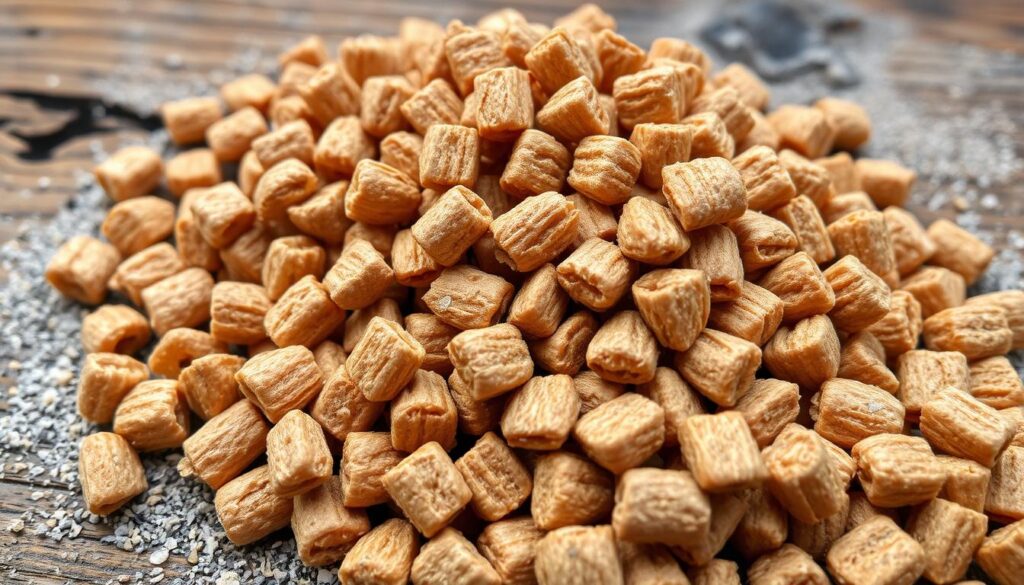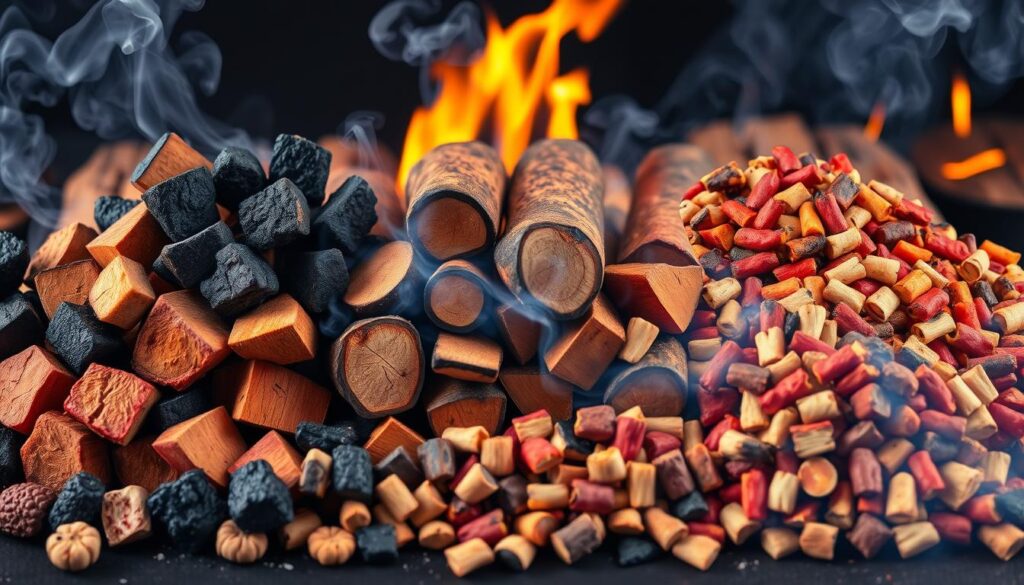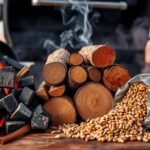Choosing the Best Fuel: Charcoal, Wood, or Pellets for Competition BBQ
Hey, grill masters! Ready to boost your competition BBQ skills? The key to amazing, award-winning BBQ is the fuel you pick. With charcoal, wood chunks, and wood pellets to choose from, finding the right one can be tough. Let’s explore the best fuel for your BBQ success.
Key Takeaways
- Charcoal, wood chunks, and wood pellets each offer unique benefits for competition BBQ
- Choosing the right fuel can make a significant difference in the flavor, smoke, and temperature control of your barbecue
- Understanding the pros and cons of each fuel type will help you select the perfect option for your competition BBQ needs
- Experimenting with fuel combinations can unlock even more complex and nuanced flavors
- Proper fuel management and temperature control are crucial for competition-level BBQ success
Introduction to Fuels for Competition BBQ
In competitive BBQ, the right fuel is key to perfect flavor, smoke, and temperature control. Whether you’re a pro or new to competition BBQ, knowing about competition BBQ fuels is vital for winning.
The Importance of Choosing the Right Fuel
Choosing the right BBQ fuel types is key for great flavors and steady temperatures in BBQ contests. The fuel you pick affects your dish’s aroma, texture, and taste. This can make or break your BBQ success.
Overview of Different Fuel Types
- Charcoal: A top pick for fuel for smokers and fuel for BBQ competitions, charcoal gives steady heat and smoky flavor to your meats.
- Wood Chunks and Logs: Hardwoods like oak, hickory, and maple add depth to your BBQ, making your dishes more complex.
- Wood Pellets: A modern choice, wood pellets offer steady heat and many flavor options for your competition BBQ fuels.
Each fuel has its own benefits and drawbacks. It’s important to know these to pick the best for your BBQ needs.
“The right fuel can make all the difference in a competition BBQ. It’s not just about the heat – it’s about the flavor, the smoke, and the overall experience you create for the judges.”
Charcoal: A Classic Choice for Competition BBQ
Charcoal is a top pick for fueling competition BBQ. It’s loved for its smoky taste, whether you choose hardwood lump charcoal or charcoal briquettes. These fuels are favorites among pit masters for their benefits.
Lump Charcoal vs. Briquettes
Lump charcoal comes from burning hardwood logs in a low-oxygen setting. This makes it pure and gives it a distinct, wood-like smell. Briquettes mix charcoal, coal, and additives for a steady burn.
Advantages and Disadvantages of Charcoal
Here are the pros and cons of charcoal for BBQ:
- Advantages:
- It adds a deep, smoky taste to meat.
- It burns consistently and reliably.
- It lets you control the temperature well.
- It’s affordable and easy to find.
- Disadvantages:
- It needs more attention to keep the temperature right.
- It makes more ash and debris than other fuels.
- It can be messier to use than pellets or wood chunks.
Choosing between hardwood lump charcoal and charcoal briquettes depends on what you like and your BBQ needs. Both are trusted by pit masters for making delicious BBQ.
Hardwood Chunks and Logs: Adding Flavor to Your BBQ
As a competition BBQ enthusiast, you know the secret to great dishes is not just the heat. It’s also the hardwood chunks or logs you add. These natural elements bring a rich, smoky flavor to your meats and veggies. This can take your competition dishes to the next level.
When picking wood chunks, you have many options, each with its own unique taste. Hickory, oak, mesquite, and apple are popular choices. Try different woods to find the perfect match for your seasonings and cooking style.
- Hickory wood chunks provide a bold, bacon-like flavor, perfect for hearty meats like brisket and ribs.
- Oak wood chunks offer a mild, slightly sweet taste that pairs well with poultry and pork.
- Mesquite wood chunks impart a robust, earthy flavor, ideal for grilling steaks and burgers.
- Apple wood chunks add a subtle, fruity aroma that can enhance the natural sweetness of meats and vegetables.
To add wood flavor to your BBQ, you can put the chunks right on the heat or wrap them in foil with small holes. Try different ways to see what works best for you and your dish.
Mastering wood chunks in competition BBQ takes patience and experimentation. Start with a little and add more until you get the smoke and flavor you want. With time and practice, you’ll make dishes that truly show off the grill’s power.
Pellets: The Modern Fuel for Competition BBQ
Wood pellets are now a top choice for competitive barbecuing. They are small, uniform pieces of compressed hardwood. They make it easy to get the right flavor and temperature for your dishes.
Understanding Wood Pellet Composition
Wood pellets are created by pressing together dried and ground hardwood. This includes sawdust or wood shavings. This method ensures a steady burn and consistent heat, making them a favorite among BBQ pros.
Variety of Wood Pellet Flavors
Wood pellets offer a wide range of flavors for BBQ. You can choose from classic options like oak and hickory to unique ones like maple and cherry. This lets you experiment and find the best flavor for your meats.
| Wood Pellet Flavor | Ideal for |
|---|---|
| Oak | Beef, Pork |
| Hickory | Beef, Pork, Poultry |
| Maple | Poultry, Vegetables |
| Cherry | Pork, Poultry |
| Mesquite | Beef, Pork |
Choosing the right wood pellet flavor can take your BBQ to the next level. It shows off your skill in smoke and flavor.

Best Fuel for BBQ Competitions
Choosing the right fuel is key in competition BBQ. You can pick from classic charcoal, aromatic wood chunks, or modern wood pellets. Each has its own benefits that affect your BBQ’s flavor, smoke, and performance. Think about these factors to pick the best fuel for BBQ competitions.
Charcoal: A Consistent Performer
Charcoal is a top choice for competition BBQ. It gives a steady heat that helps you control the temperature well. Lump charcoal is especially good because it burns clean and adds a subtle flavor to your food.
Wood Chunks: Enhancing Flavor
Wood chunks are great for adding a smoky taste to your BBQ. Hardwoods like oak, maple, and hickory bring a unique aroma to your dishes. Adding wood chunks to your charcoal setup can really make your BBQ stand out.
Pellets: Convenience and Consistency
Pellet grills are becoming more popular in competition BBQ for their ease and temperature control. Competition BBQ fuels like premium wood pellets come in many flavors. They burn consistently and are easy to manage, making them a favorite among pitmasters.
The best fuel for BBQ competitions depends on what you like and the competition’s rules. Try different fuels and mixes to find what works best for you. This will help you shine in the competition BBQ world.
“The secret to winning competition BBQ is mastering the art of fuel selection and management.” – Pitmaster John Doe
Pairing Fuels with Different Types of Meats
In competition BBQ, the meat you cook changes the best fuel choice. Choosing the right fuel, like charcoal, wood chunks, or wood pellets, is key. It makes a big difference in the flavors and results you get.
Best Fuels for Beef
For beef, pick a fuel that adds a rich, smoky taste. Lump charcoal or charcoal mixed with hardwood chunks, like oak or hickory, works great. This mix gives the beef a nice crust and keeps the juices in.
Best Fuels for Pork
Pork goes well with many wood flavors. Wood pellets from fruit woods, like apple or cherry, add a sweet touch that goes well with pork. Or, mix wood pellets with charcoal for smoke and heat balance.
Best Fuels for Poultry
- For poultry, a light, delicate smoke is best. Wood pellets from maple or alder give a subtle, buttery flavor that brings out the bird’s natural taste.
- For more complex flavors, try mixing maple or alder pellets with a bit of mesquite or hickory. This adds bold, earthy smoke.
| Meat Type | Best Fuels |
|---|---|
| Beef | Lump charcoal, Charcoal and hardwood chunks (oak, hickory) |
| Pork | Fruit wood pellets (apple, cherry), Blend of wood pellets and charcoal |
| Poultry | Maple or alder wood pellets, Blend of maple/alder and mesquite/hickory pellets |
“The key to winning a BBQ competition is mastering the art of fuel selection and management. Each meat type requires a unique approach to ensure the perfect balance of smoke, heat, and flavor.”
Tips for Fuel Management and Temperature Control
Keeping temperatures steady is key in competition BBQ. Different fuels need different ways to manage heat. This section offers tips and techniques for controlling heat with charcoal or wood pellets. This ensures your dishes are cooked just right.
Controlling Temperature with Charcoal
Using charcoal, managing air flow is crucial for temperature control. Adjust your grill or smoker vents to change oxygen flow to the coals. This affects the fire’s strength. Also, arrange charcoal in a way that creates different heat zones.
This lets you sear, roast, or slow-cook meats as needed. Try different charcoal placements and amounts to get the right balance for your dishes.
Controlling Temperature with Wood Pellets
Wood pellets offer convenience and flavor. For consistent temperatures, manage your pellets well. Adjust the pellet feed rate and air flow to control the heat. This ensures even heat for great results. Always check and refill your pellet hopper to keep temperatures steady during the competition.
No matter your fuel choice, controlling temperature is key in competition BBQ. Follow these tips to master temperature control. This will help you cook meats perfectly, impress judges, and win over competitors.
Combining Fuels for Unique Flavors
In competitive barbecue, finding that special flavor is key. Each fuel type – charcoal, wood chunks, and wood pellets – has its own strengths. But the best grill masters blend these to create unique tastes. This blending lets you make smoking profiles that make your food stand out.
Understanding each fuel’s unique qualities is crucial. Lump charcoal burns hot and clean, giving a steady heat. Hardwood chunks add a strong smoke flavor that goes well with beef or pork. Wood pellets offer a subtle smoke that can match any meat.
By mixing these fuels, you can make flavors that take your BBQ to the next level. Try combining different woods or adding charcoal to your hardwood for the right mix of heat and flavor. With creativity, the options are endless in combining fuels for unique flavors.
| Fuel Combination | Flavor Profile | Best Suited for |
|---|---|---|
| Lump Charcoal + Hickory Chunks | Bold, Smoky, Slightly Sweet | Beef Brisket, Pork Shoulder |
| Oak Pellets + Maple Chips | Nuanced, Subtly Sweet, Slightly Nutty | Turkey, Chicken |
| Mesquite Chunks + Lump Charcoal | Intense, Earthy, Robust | Beef Ribs, Lamb |
Starting your competition BBQ fuel combinations journey means finding the right balance of flavors. With some trial and a lot of passion, you can make smoking profiles that wow judges and win competitions.

“The secret to competition-worthy barbecue is in the fuel. By combining the right elements, you can unlock a world of flavor that sets your dishes apart.”
Conclusion
Choosing the right fuel is key to winning in BBQ competitions. You can pick from classic charcoal, aromatic hardwood chunks, or modern wood pellets. Each has its own benefits that can make your dishes stand out.
Success comes from knowing the unique traits and flavors of each fuel. Then, match them with the right meats and cooking methods. This way, you can show off your cooking skills. Mastering fuel and temperature control will help you win.
Before your next BBQ competition, look into all the fuel options. Find the one that sparks your passion for BBQ. With the right fuel, you can make amazing dishes. This will lead you straight to the top.

Leave a Reply